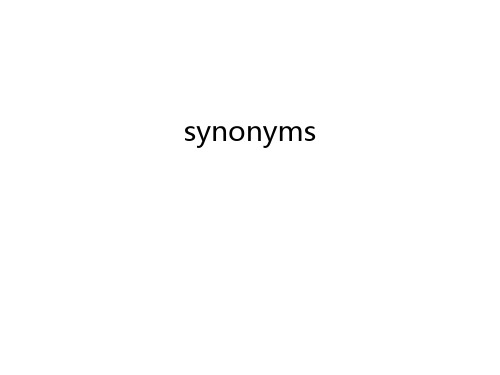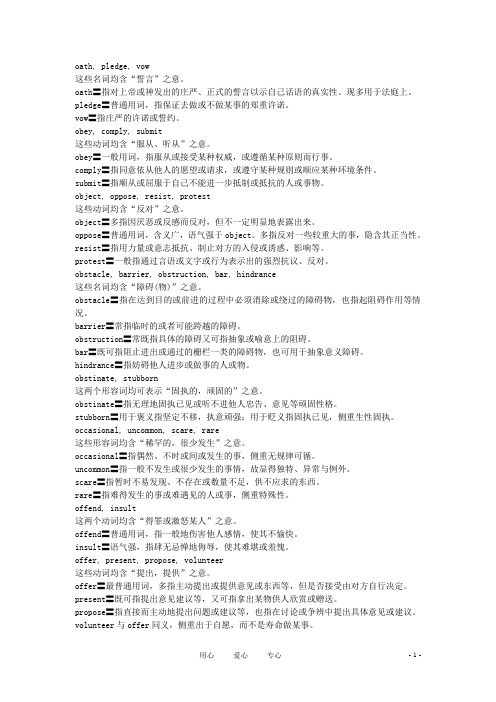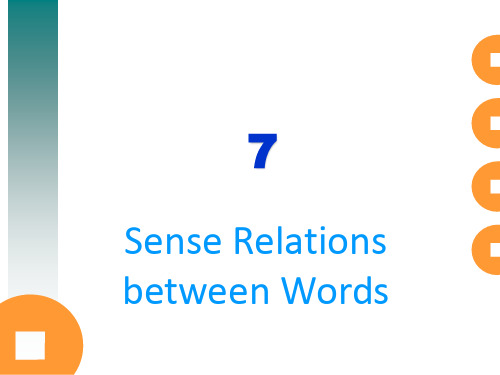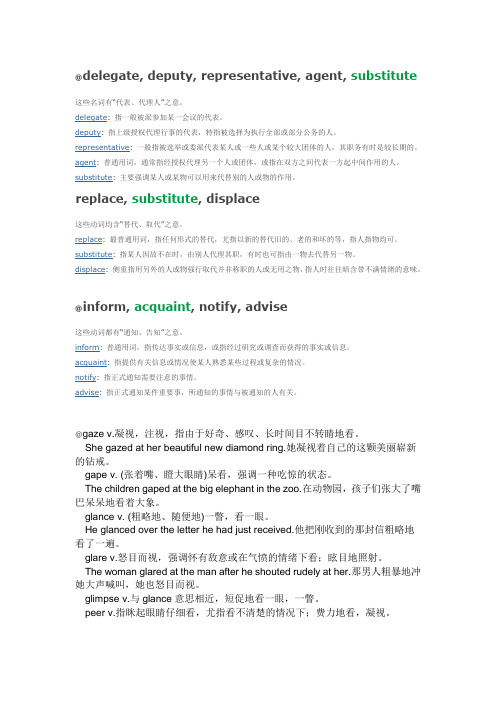Synonym list
synonyms教学文稿

• synonyms that differ in their emotive or evaluative meaning, which bear the same meaning but express emotion of the user
e.g. like / love mean / stingy
行李 luggage baggage
卡车 lorry
truck
•stylistic synonym
文体同义词
• synonyms which differ in style (some words tend to be more formal, others casual, and still others neutral in style)
•Denote different ways of laughing
•It is hardly possible to find an English word which has exactly the same meaning and implication as a Chinese word.
•collocational synonym
搭配区别上的同义词
•synonyms that differ in their collocation, i.e. in the words they go together with
e.g. accuse…of / charge…with
•semantic synonym
语义上有差异的同义词
• synonyms that differ slightly in what they mean
e.g. Laugh---to smile with sounds of the voice
初中英语 常用同义词辨析 English Synonyms O 素材

oath, pledge, vow这些名词均含“誓言”之意。
oath〓指对上帝或神发出的庄严、正式的誓言以示自己话语的真实性。
现多用于法庭上。
pledge〓普通用词,指保证去做或不做某事的郑重许诺。
vow〓指庄严的许诺或誓约。
obey, comply, submit这些动词均含“服从、听从”之意。
obey〓一般用词,指服从或接受某种权威,或遵循某种原则而行事。
comply〓指同意依从他人的愿望或请求,或遵守某种规则或顺应某种环境条件。
submit〓指顺从或屈服于自己不能进一步抵制或抵抗的人或事物。
object, oppose, resist, protest这些动词均含“反对”之意。
object〓多指因厌恶或反感而反对,但不一定明显地表露出来。
oppose〓普通用词,含义广,语气强于object。
多指反对一些较重大的事,隐含其正当性。
resist〓指用力量或意志抵抗、制止对方的入侵或诱惑、影响等。
protest〓一般指通过言语或文字或行为表示出的强烈抗议、反对。
obstacle, barrier, obstruction, bar, hindrance这些名词均含“障碍(物)”之意。
obstacle〓指在达到目的或前进的过程中必须消除或绕过的障碍物,也指起阻碍作用等情况。
barrier〓常指临时的或者可能跨越的障碍。
obstruction〓常既指具体的障碍又可指抽象或喻意上的阻碍。
bar〓既可指阻止进出或通过的栅栏一类的障碍物,也可用于抽象意义障碍。
hindrance〓指妨碍他人进步或做事的人或物。
obstinate, stubborn这两个形容词均可表示“固执的,顽固的”之意。
obstinate〓指无理地固执已见或听不进他人忠告、意见等顽固性格。
stubborn〓用于褒义指坚定不移,执意顽强;用于贬义指固执已见,侧重生性固执。
occasional, uncommon, scare, rare这些形容词均含“稀罕的,很少发生”之意。
英语词汇学6.3Synonymy

expectation: either good or evil. anticipation: as a rule is a pleasurable expectation of something good. hope: is not only a belief but a desire that some event would happen.
7
Sense Relations between Words
-nyms Most wonderful of all are words, and how they …[relate] one with another.
O. Henry, as modified by a semantician
Words are related to one another in a variety of ways. These relationships have words to describe them that often end in the bound morpheme –nym It may be more accurate to think of the lexicon as network, rather than a listing of words as in a published dictionary.
to hope against hope, • to • lose • hope,• to pin one's hopes on sth.•
7.1.2 Patterns of synonymous sets in Modern English
Why so many synonyms? English is a language particularly rich in pairs of synonyms. The primary reason for this has to do with the history of language and especially with the wholesome borrowing from other languages. "The richness of • English • in synonyms is largely due to the happy mingling of Latin, French and Native elements". Generally speaking, the native words are the simplest and most ordinary and tends to belong to the ordinary colloquial language; The Greek or Latin borrowings are the most learned, most formal and most technical and they tend to be used in the most formal context; French borrowings stands between the native words and the Latin and Greek borrowings.
synonym

@delegate, deputy, representative, agent, substitute 这些名词有“代表、代理人”之意。
delegate: 指一般被派参加某一会议的代表。
deputy: 指上级授权代理行事的代表,特指被选择为执行全部或部分公务的人。
representative: 一般指被选举或委派代表某人或一些人或某个较大团体的人,其职务有时是较长期的。
agent: 普通用词,通常指经授权代理另一个人或团体,或指在双方之间代表一方起中间作用的人。
substitute: 主要强调某人或某物可以用来代替别的人或物的作用。
replace, substitute, displace这些动词均含“替代、取代”之意。
replace: 最普通用词,指任何形式的替代,尤指以新的替代旧的、老的和坏的等,指人指物均可。
substitute: 指某人因故不在时,由别人代理其职,有时也可指由一物去代替另一物。
displace: 侧重指用另外的人或物强行取代并非称职的人或无用之物,指人时往往暗含带不满情绪的意味。
@inform, acquaint, notify, advise这些动词都有“通知、告知”之意。
inform: 普通用词,指传达事实或信息,或指经过研究或调查而获得的事实或信息。
acquaint: 指提供有关信息或情况使某人熟悉某些过程或复杂的情况。
notify: 指正式通知需要注意的事情。
advise: 指正式通知某件重要事,所通知的事情与被通知的人有关。
@gaze v.凝视,注视,指由于好奇、感叹、长时间目不转睛地看。
She gazed at her beautiful new diamond ring.她凝视着自己的这颗美丽崭新的钻戒。
gape v. (张着嘴、瞪大眼睛)呆看,强调一种吃惊的状态。
The children gaped at the big elephant in the zoo.在动物园,孩子们张大了嘴巴呆呆地看着大象。
English Synonyms L

label, tag这两个名词均含“标签”之意。
label : 指上面标明货主姓名、地址及货物名称、重量、尺寸等内容的标签。
tag : 多指临时系上的标签。
lack, need, want, require这些动词均有“缺少、短少”之意。
lack : 指完全短缺或数量不足。
need : 语气较重,指需要必不可少的东西,强调急需。
want : 侧重缺少某种必需之物,或个人渴望得到的东西。
require : 使用广泛,语气较轻。
强调急需时可与need换用,但有时暗示所需的人或物是完成某一任务必不可少的。
lack, want, absence, shortage, scarcity这些名词均含“缺乏,不足”之意。
lack : 普通用词,指部分或完全的不足。
want : 指完全或短缺某物,侧重缺少之物是必需的东西。
使用范围比lack窄些。
absence : 指某物根本不存在或完全短缺,或某人虽存在,但未到现场。
shortage : 指不足,但侧重达不到规定的,需要的或已知应有的数量。
scarcity : 指产量不足或缺乏某物难以应付或满足需要。
lame, cripple这两个动词均含“使跛,使残废”之意。
lame : 普通用词,指因受伤或本身的生理缺陷而使人的身体致残,着重行走时的不便。
cripple : 正式用词,语气较强。
多指因伤、体弱或疾病等所导致的永久性残废,常为肢体不全,行走不便,甚至移动身体也困难。
lamp, light这两个名词均有“灯”之意。
lamp : 通常指以油、气或电为能源的照明设备,一般有罩。
light : 普通用词,含义广泛。
泛指一切供照明的灯,多指电灯。
laguage, speech, tongue, dialect, idiom, slang这些名词均含“语言”之意。
laguage : 普通用词,含义广。
指人的语言或文字,或动物的语言。
既可指口头或书面语言,也可指手势语等。
英语词汇学术语翻译

英语词汇学术语翻译 Ting Bao was revised on January 6, 20021T e r m i n o l o g y T r a n s l a t i o n s o n l e x i c o l o g y英语词汇学术语翻译Aacronym 首字母拼音词acronymy 首字母拼音法addition 增词adjective compound 复合形容词affective meaning 感情意义affix 词缀affixation 词缀法Albanian 阿尔巴尼亚语(族)aliens 非同化词alliteration 头韵(法)allomorph 词素(形位)变体ambiguity 歧义amelioration of meamng 词义的升华analogy 类推analytic language 分析性语言antithsis 对偶antonym 反义词antonymy 反义关系appreciative term 褒义词archaic word 古词archaism 古词语argot 隐语(黑话)Armenian 亚美尼亚语(族)Associated transfer 联想转移association 联想associative meanings 关联意义Bback-formation 逆生法back clipping 词尾截短Balto-Slavic 波罗斯拉夫语(族)bilinguall 双语的basic word stock 基本词汇blend 拼缀词blending 拼缀法borrowed word 借词bound form粘着形式bound morpheme 粘着语素(形位)bound root 粘着词根Ccasual style 随便文体catchPhrase 时髦语Celtic 凯尔特语(族)central meaning 中心意义Clipping 截短法collocability 搭配能力collocation 搭配collocative meaning 搭配意义colloquialism 口语词(口语体)complete synonym 完全同义词complex word 复杂词composition 复合法compound 复合词compounding 复合法concatenation 连锁型concept 概念conceptual meaning 概念意义connotation 内涵connotative meanins 内涵意义constituent 要素.成分consultative style 交谈体(咨询体)content word 实义词context 语境contradictory term矛盾反义词contrary terms 对立反义词conversion 转类法couplet 成对词Dde-adjective 由形容词转化的de-adjectival 由形容词转化的degradation of meaning 词义的降格deletion 减词denizen 同化同denominal 由名词转化的denotation外延denotative meaning 外延意义derivation 派生法derivational affiX 派生词缀derivative 派生词derived meaning 派生意义derogatory sense 贬义desk dictionary 案头词典deverbal noun 由动词转化的名词deverbal suffix 加于动词的后缀diachronic approach 历时角度dialectal word 方言词discipline 学科dismembering 肢解distribution分布doublet 成对词duplication of synonyms 同义词并举Fformal 正式的free form 自由形式free morpheme 自由语素(形位)free root 自由词根frontclipping 首部截短front and back clipping 首尾部截短frozen style 拘谨体full conversion 完全转换functional shift 功能转换Ggeneralisation of meaning 词义的扩大Germanic 日耳曼语族grammatical meaning 语法意义gradable adjective 等级形容词grammatical context 语法语境grammatical feature 语法特征graphology 书写法;图解法HHellenic 希腊语族heterogeneous 多质的highly-inflected 高度屈折化的homograph 同形异义词homonym 同形同音异义词homonymy 同形同音异义关系homphone 同音异义词hyperonym 上义(位)词hyponym 下义(位)词hyponymy 上下义(位)关系Iidiom 习语idiomatic expression 习惯表达idiomaticity 习语程度Indo-European Language Family 印欧语系Indo-Iranian 印伊语族inflection 屈折变化inflectional affix 屈折词缀intensity of meaning 意义强度initialism 首字母缩略词intermediate member 中间成分intimate style 亲昵语体Italic 意大利语族Jj uxtaposition of antonyms反义词并置L1exical context 词汇语境lexical item 词汇项目lexicography 词典学lexicology 词汇学lexis 词汇linguistic context 语言语境literary 书面的loan word 借词lexical meaning 词汇意义Mmarked term有标记项metaphor 暗喻metonymy 换喻monolingual 单语的morph 形素monomorphemic 单语素的monosemic 单义的morpheme 词素(形位)morphological structure 形态结构morphology 形态学motivation 理据motivated 有理据的Nnative word 本族语词neoclassical 新古典词的neologism 新词语notional word 实义词Oobjective meaning 客观意义obsolete 废弃词onomatopoeic motivation 拟声理据Orthographic feature 拼写特征PPartial conversion 部分转化Pejoration 贬义化Perpect homonym 同形同音异义词phonetic feature 语音特征phono1ogical 音位学的phonology 音位学phrasal verb 短语动词phrase clipping 短语截短pocket dictionary 袖珍词典polysemic 多义的polysemous 多义的polysemant 多义词polysemantic 多义的polysemy 多义关系pormanteau word 拼级词positionshifting 移位prefix 前缀prefixation 前缀法primary meaning 原始意义productivity 多产性pun 双关语Rradiation 辐射range of meaning 词义范围reduplication 重叠referent 所指物reference 所指关系referential meaning 所指意义regional variety 地域变体register 语域reiteration(意义)重复。
synonym

locale = place 现场,场所
locale = place 场所
lucrative = profitable 有利的,赚钱的
elaborate = detailed 详细阐述的,精细
elaborate 的反义词 详细阐述的,精细
elapsed = passed 过去的,经过的
article = item 文章,项目
assertion = strong statement 主张
asset = advantage 优点
asset 答案让我迷惑的有problem or advantage 我跟据上下文选了第二个
disintegrate = fall apart 分解
dispensable = essential 不重要的
earned 选项为admired, invented, discovered, allowed
assistance = help 协助,援助
avenues = means 方法,途径
broad appeal = popular 流行的
bulk = majority 大批,大多数
chaotic = disorganized 无组织的
cherish = valued 珍爱,爱惜
ground 我选的是reason(我的JJ,大家慎用哦)
groundless = unfounded 无根据的
groundless = unfounded 无根据的
groundwork = foundation 基础
alarm = warning 警告
albeit = although 虽然
albeit = although 虽然
英语词汇学第六章解析

第六章词汇:Polysemy n. 一词多义peculiar n. 特权;特有财产adj. 特殊的Diachronic 历时性Synchronic 共时性Radiation 放射法garments n. [服装] 服装,衣着Concatenation n. 串联,连结tern 三个一组的candidate n. 候选人preceding v. 在...之前Homonyms n. [语] 同形同音异义词identical adj. 同一的;完全相同的Homographs同形异义词Homophones 同音异形异义Rhetoric 修辞puns n. 双关语sarcasm n. 讽刺ridicule n. 嘲笑embrace vt. 拥抱;信奉,皈依;包含connotation n. 内涵Antonymy 反义词predecessor 前任vice versa 反之亦然Hyponymy 上下位关系要点一. 1.Polysemy—polysemy is a common feature peculiar to all natural languages. When a words is first coined, it always monosemic, butin the course of development , the same word may have two or more different meanings.e.g. The word "flight" may mean "passing through the air", "power of flying", "air of journey", etc.2.Two approaches1).( Diachronic approach –Diachronically, polysemy is assumed to be the result of growth and development ofthe semantic structure of one and same word.This first meaning is the primary meaning. With the advance of timeand the development of language, it took on more and more meanings. These latter meanings are called derived meanings.E.g. faceThe primary meaning gave birth to new meaning.The primary meaning become either absolute or disappeared altogetherE.g. harvesttime of cutting reaping and gathering the cropsa season‘s yield of grain or fruitPain penalty or punishment pains and penaltyupon/under pain of suffering2).Synchronic approach –synchronically, polysemy is viewed as the coexistent of various meaning of the same word in a certain historical period of time.The basic meaning of a word is the core of word meaning.The core of word meaning called the central meaning (secondary meaning).The central meaning has gradually dimished in currency with the changes and one ofthe derived meanings has become dominant.E.g. gay3.Two process of development1). Radiation-a semantic process which shows that the primary meaning stands at the center and each of the derived meanings proceed out of in every direction like rays.The meanings are independent of one another, but can all be tracked back to thecentral meaning.e.g. Neck1) That part of a man or animal jointing the head to the body2) That part of the garments3) The neck of an animal used as food4) A narrow part between the head and body or base of any object5) The part of anythingOf the 5 meanings 1) is the primary and all the rest are derived but each of the otherfour is directly related to 1).Therefore, we say neck has developed through the process of radiation.2).Concatenation –meaning ―linking together, is the semantic process in which the meaning of a word moves gradually away from its first sense by successive shifts until,in many cases, there is not a sign of connectionbetween the sense that is finally developed and that which the term hadat the begining.e.g. candidate1) White-robed adj. 穿白色长袍的2) Office seeker in white gouns3) A person who seeks an office4) A person proposed for a place, award, etc.Of the 4 meanings, 1) is the primary meaning and the other three are derived, but each of the derived meaning isonly directly related to the preceding one and there is no direct connection between 1) and 4). Therefore, we saycandidate has developed through the process of concatenation.3).DifferenceRadiation and concatenation is closely related, being different stages of thedevelopment leading to polysemy.Radiation, each of the derived meaning is directly connected to the primary meaning.Concatenation, each of the later meaning is related only to the preceding one likechains. Though the latest sensecan be tracked to the original, there‘s no direct connection in between.The two processes work together, complementing each other.Radiation precedes concatenation.1.Homonyms--are generally defined as words different in meaning but either identical both i n s ound and spellingor identical only in sound or spelling.2.1).Perfect Homonyms--are words identical both in sound and spelling, but different in meaning.e.g. bank/bank ,bear/bear ,date/date2).Homographs--are words identical only in spelling but different in sound and meaning.e.g. Bow/bow ,Sow/sow3).Homophones (most common)--are words identical only in sound but different in spelling a nd meaning.e.g. Dear/dear ,Right/rite ,Son/sun3.Origins of Homonyms1). Change in sound and spelling(homonyms are native by origin, derived from different earlier forms in OldEnglish. The change in sound and spelling gradually made them identical in modernEnglish.)e.g. ear/ear ,long/long2). Borrowing (many words of foreign origin coincide in sound and/or spelling withthose of native origin with those of other foreign origin.)e.g. fair/fair,ball/ball3). Shortening (many shortened forms of words happen to be identical with otherwords in spelling or sound)e.g. ad/add,rock/rock ,NOW/now4.Differentiation of Homonyms and polysemants(Perfect homonyms and polysemants are fully identical regard to spelling and pronunciation. )Homonyms refer to different word, which happen to share the same forms.Polysemant is the one and some word, which has several meanings.1).One important criterion is to see their etymology. Homonyms are from differen tsources. A polysemant is from the same source,which has acquired different meaning in the course of development.2). The second principle is semantic relatedness.The various meanings of a polysemant are correlated andconnected to some central meaning to a greater or less degree. Meanings of different homon yms have nothing to do with one another.5.Rhetoric featureThey create puns for desired effect of, say, humour, sarcasm or ridicule.三.1.Synonyms—are words different in sound and spelling but most nearly alike or exactly the same in mean ing.Synonyms share a likeness in denotation and in part of speech.2.Types of Synonyms1).Absolute (Complete) Synonyms--are words, which are identical in meaning inall its aspects, both in grammatical meaning and lexical meaning,including c onceptual and associative meanings.Absolute (Complete) Synonyms are restricted to high-specialized vocabulary.For instance, composition / compounding. They have the perfect same meaningin Lexicology.2).Relative (Near) synonyms--are similar or nearly the same in denotation but embrace different shades of meaning or different degrees of a given quality.e.g. Change/alter/varyTake stagger/reel/totter for example.Stagger implies unsteady movement characterized by a loss of balance and failure to maintai n a fixed course.E.g. stagger under a heavy load;Reel suggests a swaying or lurching so as to appear on the verge of falling.E.g. The drunken man reeled down the hall;Totter indicates the uncertain, faltering steps of a feeble old person or of an infant learning to walk.3.Sources of Synonyms1).Borrowing: (the most important source)2).Dialects and regional English:eg.Railway (BrE) railroad (AmE)Mother (BrE) minny (ScotE)Charm (BrE) glamour (ScotE)Ranch (AmE) run (AusE)Job (StandE) gig (BlackE)Jim (BlachE) mal person (StandE)3).Figurative a. 比喻的,象征的and euphemistic a.委婉的use of words:Occupation walk of life (fig.)Dreamer star-gazer (fig.)Drunk elevated (euph.)Lie distort the fact (euph.)4).Coincidence with idiomatic expressions:Win gain the upper handDecide make up one‘s mindFinish get throughHesitate be in two mindsHelp lend one a hand4.Discrimination of Synonyms1) Difference in denotation: differ in the range and intensity of meaning.Range (some words have a wider range of meaning than others)e.g. timid--timorousTimid is applied to the state of minds in which a person may happen to be at the moment, ant to the habitual disposition.Timorous is only to the disposition.Comprehend/ understandextend—increase—expandThe owner of the restaurant is going to extend the kitchen by ten feet this year. The company has decided to increase its sales by ten percent next year.The metal will expand if heated.Extent increase expand Differ in degree of intensitye.g. wealth—richThe wealth person is to posses more money and property than a rich man.work – toilWork is a general term having no special implications as ‗light‘ or ‗heavy‘, and‗mental‘ or ‗physical‘.Toil suggests ‗heavy and tiring work‘, associated with more with manual thanmental labor.want—wish—desireWant is the most general and has the widest range of meaning.Wish and desire are much narrow in sense2) Difference in connotation: differ in the stylistic and emotive coloring.Some words share the same denotation but differ in their stylistic appropriateness.E.g. The words borrowed from French and Latin are more formal than native words.These borrowings are more appropriate formal and technical writing.policeman – constable – bobby – coppoliceman(neutral) – constable(neutral) – bobby(colloquial) – cop(slangy)ask -- beg -- requestask (neutral); beg (colloquial); request (formal)archaic and poetic, which are self-suggestive.e.g.ire/anger,bliss/happiness,forlorn/distressed,dire/dreadful,list/listen,enow/enough,save/exp ect,mere/lake andsuch like are all synonyms, but in each the second is standard in usage whereas the first on e is old-fashioned and archaic, only found in poetry, earlier writing, etc.Many synonyms have clear affective valuesresult – consequence result(neutral ) – consequence(negative implication)big –greatbig(the bigness of size, volume and so on, without any emotive coloring) -great(suggest distinguished, eminent, outstanding)little – small – tinylittle (attractiveness, pleasantness)– small(not big),tiny(abnormal growth of the child)3) Difference in application: differ in usage.Many words are synonyms in meaning but different in usage in simple terms.They form different collocations and fit into different sentence patterns.E.g. allow – letallow sb to so sth. – let sb. do sth.answer – replyanswer(transitive v.) the letter – reply(intransitive v.) to the lettersense –meaningHe is a man of sense.empty -- vacantempty box/street/room (no one or nothing inside) vacant seat/chair/apartment(not occupied) lump –slice – chunk – sheet –cakea lump sugar– a slice of meat – a chunk of wood – a sheet of paper –a cake of soap四.1.Antonymy--is concerned with semantic opposition.Antonyms--are words which are opposite in meaning.2.Types of Antonyms (according to the semantic opposition )1) Contradictory terms –these antonyms are truly represent oppositeness of meaning. They are so opposed toeach other that they are mutually exclusive and admit no possibility between them.They assertion of one is the denial of the other.E.g. alive—dead, present--absent, male – female, boy – girl, true – false,same – different, imperfect –perfectSuch antonyms are non gradable.They can not be used in comparative degrees and do not allow adverbs like―very to qualify them. (single/married)特点:对立的/不可分级2) Contrary terms- a scale running between two poles or extremes. The two opposites are gra dable and one exists in comparison with the other.E.g. rich--(well-to-do)--poor; old –(middle-aged)-- young,open –(ajar)—close,beautiful –(good-looking) –(plain) –ugly,hot--(warm, cool)--coldverbs. E.g. love – (attachment) – (liking) – (indifferent) –(antipathy) -- hate3) Relative terms–consist of relational oppositeness. The pairs of words indicate such a socialrelationship that one of them can not be used without suggesting the other,the type is also reverse terms. The two words of each pair interdependent.E.g. parent--child; husband--wife; predecessor –successor, employer -- employee sell—buy, give –receive3.difference between relative terms and contradictory termsthere is an absolute opposite between relative terms and contradictory terms. In the case of relative terms, the opposition is only relational.contradictory terms –e.g. if the adult is not a man, then the adult must be a woman.4.the characteristics of antonyms1). Antonyms are classified on the basis of semantic opposition.形容词(most) -- 动词–名词(least)There are a great many more synonyms than antonyms.Words denoting nature, quality or state of things have many antonyms. This accounts for the large number of antonyms are adjectives.2). A word which has more than one meaning can have more than one antonym.e.g. fast – firm/secure loose quick slowpleasure-seeking/wild soberdull -- boring interestingShe became dull and silent during the last part of the journey.lively dull weather sunny ,dull noise sharp,dull pain acutethese factors affect both intelligent and dull children. Intelligent3).Antonyms differ in semantic inclusion.Pairs of antonyms are seen as marked and unmarked terms. One member is morespecific than the other and the meaning of the specific is included in that of the general.e.g. man–womanThere has been no man in the island. (man signifies human being, including women, but not v ice versa).dog-male/ female dogtall—shortHow tall is his brother? (includes the meaning of next one)How short is his brother? (more restricted in sense)4). Contrary terms are gradable antonyms, differing in degree of intensity, so each hasits own corresponding opposition.e.g. hot – cold, warm – cool, rich – poor, destitute – opulentSome words can have two different types of antonyms at the same time, one being negative and the other opposite.e.g. happy—unhappy-sad,productive—unproductive—destructivefree--unfree-enslaved5.the use of antonymsAntonyms have various practical uses and have long proved helpful and valuable indefining the meanings of words.fresh bread –stale bread, fresh air –stuff air, fresh flower -faded flower,fresh look – tired lookAntonyms are useful to express economically the opposition of a particular thought,often for the sake for contrast. They look neat and pleasan t, and sound rhythmicMany idioms are formed with antonyms.Rain and shine无论如何Here and there到处Weal and woe祸福Friend and foe敌友Now or never机不可失Thick and thin不顾艰难,险阻High and low到处Give an take互让,平等Antonyms are often used to form antithesis to achieve emphasis by puttingcontrasting idea together.Easy come, easy go. 来的易,去得快。
- 1、下载文档前请自行甄别文档内容的完整性,平台不提供额外的编辑、内容补充、找答案等附加服务。
- 2、"仅部分预览"的文档,不可在线预览部分如存在完整性等问题,可反馈申请退款(可完整预览的文档不适用该条件!)。
- 3、如文档侵犯您的权益,请联系客服反馈,我们会尽快为您处理(人工客服工作时间:9:00-18:30)。
Common Synonyms List A - I Common WordsSynonyms List
about- approximately, nearly, close to, almost, approaching also-moreover, besides, as well as, in addition to, too amazing-astonishing, startling, stunning, dazzling, remarkable awesome-impressive, fabulous, astonishing, outstanding awful-dreadful, alarming, frightful, terrible, horrid, shocking bad- offensive, repulsive, corrupt, wicked, defective
beautiful- attractive, appealing, alluring, gorgeous, handsome begin- commence, initiate, introduce, launch, originate
big- huge, immense, massive, enormous
boring- tedious, tiresome, commonplace, monotonous
but- yet, still, nevertheless, though, however, moreover change- alter, transform, vary, diversify
choose- select, elect, nominate, identify, prefer
cool-rad, killer, wonderful, marvelous, fantastic, awesome definitely- unquestionably, precisely, positively, clearly
easy- effortless, natural, comfortable, relaxed
excellent- superior, unsurpassed, superb, magnificent
exciting- thrilling, stirring, rousing, chilling
fast- swift, quick, fleet, hasty, instant
finish- complete, conclude, achieve, deplete, consume
fun- pleasant, pleasurable, amusing, entertaining, jolly
funny- comical, amusing, entertaining, bizarre, laughable
get- obtain, receive, acquire, achieve
give-donate, supply, deliver, distribute
good-satisfactory, fine, competent
got- received, obtained, attained, succeded in
great- tremendous, remarkable, superior, expert, wonderful guy- man, dude, person, fellow, boy
happy- pleased, joyous, elated, jubilant, cheerful, delighted hard- complex, complicated, difficult, rigorous, harsh
help- assist, aid, support, serve, sustain
hurt- injure, impair, harm, damage, wound
important- significant, substantial, meaningful, critical, vital interesting -absorbing, fascinating, thought-provoking, appealing, entertaining。
